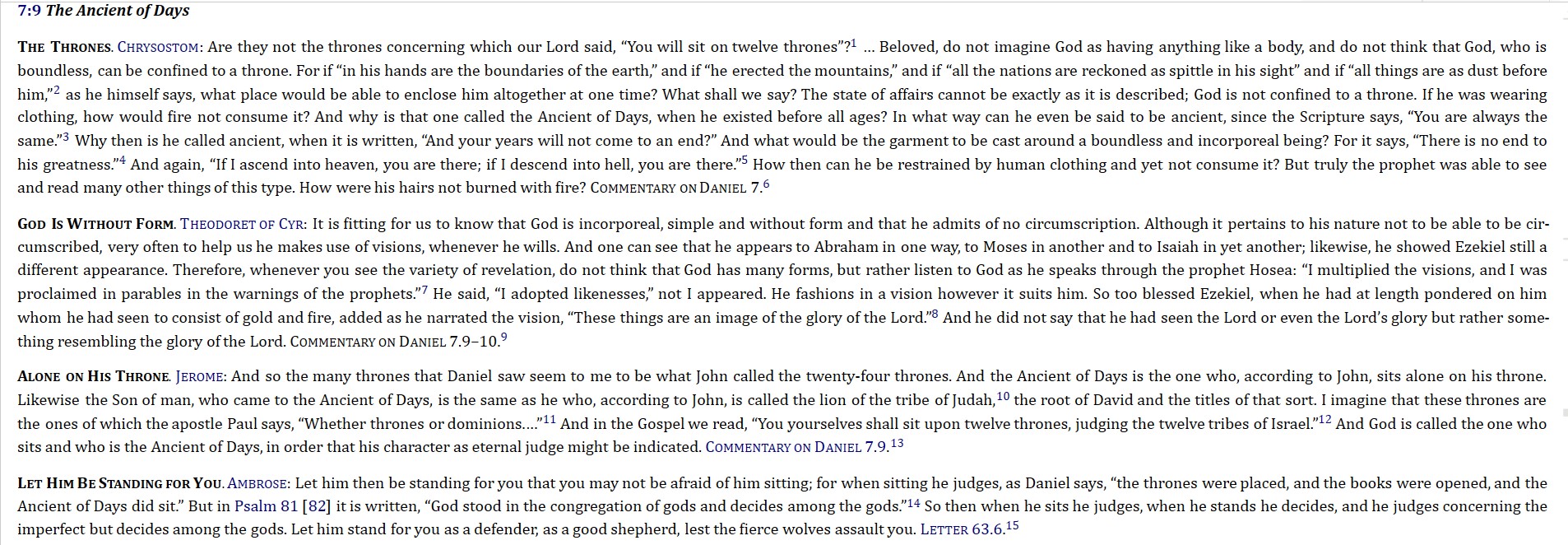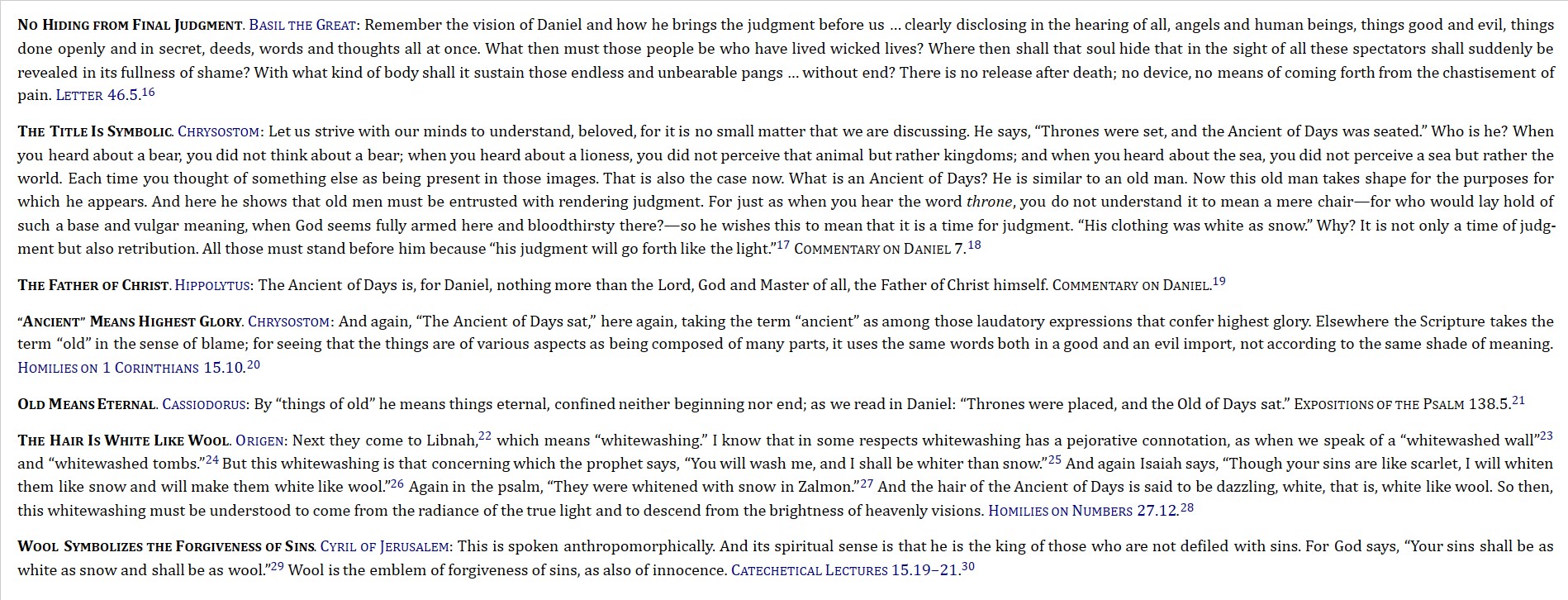Kenneth Stevenson and Michael Gluerup provide early Chrisitan commentaries on the "Ancient of Days" of Daniel 7.
- Type
- Book
- Source
- Kenneth Stevenson Non-LDS
- Hearsay
- Direct
- Reference
Ancient Christian Commentary on Scripture: Ezekiel, Daniel, ed. Kenneth Stevenson and Michael Gluerup (Downers Grove, Illinois: InterVarsity Press, 2008), 229–232 (Logos ed.)
- Scribe/Publisher
- InterVarsity Press, Logos
- People
- Kenneth Stevenson, Michael Gluerup
- Audience
- Reading Public
- Transcription
7:9 The Ancient of Days
THE THRONES. CHRYSOSTOM: Are they not the thrones concerning which our Lord said, “You will sit on twelve thrones”? … Beloved, do not imagine God as having anything like a body, and do not think that God, who is boundless, can be confined to a throne. For if “in his hands are the boundaries of the earth,” and if “he erected the mountains,” and if “all the nations are reckoned as spittle in his sight” and if “all things are as dust before him,”2 as he himself says, what place would be able to enclose him altogether at one time? What shall we say? The state of affairs cannot be exactly as it is described; God is not confined to a throne. If he was wearing clothing, how would fire not consume it? And why is that one called the Ancient of Days, when he existed before all ages? In what way can he even be said to be ancient, since the Scripture says, “You are always the same.” Why then is he called ancient, when it is written, “And your years will not come to an end?” And what would be the garment to be cast around a boundless and incorporeal being? For it says, “There is no end to his greatness.”4 And again, “If I ascend into heaven, you are there; if I descend into hell, you are there.” How then can he be restrained by human clothing and yet not consume it? But truly the prophet was able to see and read many other things of this type. How were his hairs not burned with fire? COMMENTARY ON DANIEL 7.
GOD IS WITHOUT FORM. THEODORET OF CYR: It is fitting for us to know that God is incorporeal, simple and without form and that he admits of no circumscription. Although it pertains to his nature not to be able to be circumscribed, very often to help us he makes use of visions, whenever he wills. And one can see that he appears to Abraham in one way, to Moses in another and to Isaiah in yet another; likewise, he showed Ezekiel still a different appearance. Therefore, whenever you see the variety of revelation, do not think that God has many forms, but rather listen to God as he speaks through the prophet Hosea: “I multiplied the visions, and I was proclaimed in parables in the warnings of the prophets.” He said, “I adopted likenesses,” not I appeared. He fashions in a vision however it suits him. So too blessed Ezekiel, when he had at length pondered on him whom he had seen to consist of gold and fire, added as he narrated the vision, “These things are an image of the glory of the Lord.”8 And he did not say that he had seen the Lord or even the Lord’s glory but rather something resembling the glory of the Lord. COMMENTARY ON DANIEL 7.9–10.
ALONE ON HIS THRONE. JEROME: And so the many thrones that Daniel saw seem to me to be what John called the twenty-four thrones. And the Ancient of Days is the one who, according to John, sits alone on his throne. Likewise the Son of man, who came to the Ancient of Days, is the same as he who, according to John, is called the lion of the tribe of Judah, the root of David and the titles of that sort. I imagine that these thrones are the ones of which the apostle Paul says, “Whether thrones or dominions.…”11 And in the Gospel we read, “You yourselves shall sit upon twelve thrones, judging the twelve tribes of Israel.” And God is called the one who sits and who is the Ancient of Days, in order that his character as eternal judge might be indicated. COMMENTARY ON DANIEL 7.9.
LET HIM BE STANDING FOR YOU. AMBROSE: Let him then be standing for you that you may not be afraid of him sitting; for when sitting he judges, as Daniel says, “the thrones were placed, and the books were opened, and the Ancient of Days did sit.” But in Psalm 81 [82] it is written, “God stood in the congregation of gods and decides among the gods.” So then when he sits he judges, when he stands he decides, and he judges concerning the imperfect but decides among the gods. Let him stand for you as a defender, as a good shepherd, lest the fierce wolves assault you. LETTER 63.6.
NO HIDING FROM FINAL JUDGMENT. BASIL THE GREAT: Remember the vision of Daniel and how he brings the judgment before us … clearly disclosing in the hearing of all, angels and human beings, things good and evil, things done openly and in secret, deeds, words and thoughts all at once. What then must those people be who have lived wicked lives? Where then shall that soul hide that in the sight of all these spectators shall suddenly be revealed in its fullness of shame? With what kind of body shall it sustain those endless and unbearable pangs … without end? There is no release after death; no device, no means of coming forth from the chastisement of pain. LETTER 46.5.
THE TITLE IS SYMBOLIC. CHRYSOSTOM: Let us strive with our minds to understand, beloved, for it is no small matter that we are discussing. He says, “Thrones were set, and the Ancient of Days was seated.” Who is he? When you heard about a bear, you did not think about a bear; when you heard about a lioness, you did not perceive that animal but rather kingdoms; and when you heard about the sea, you did not perceive a sea but rather the world. Each time you thought of something else as being present in those images. That is also the case now. What is an Ancient of Days? He is similar to an old man. Now this old man takes shape for the purposes for which he appears. And here he shows that old men must be entrusted with rendering judgment. For just as when you hear the word throne, you do not understand it to mean a mere chair—for who would lay hold of such a base and vulgar meaning, when God seems fully armed here and bloodthirsty there?—so he wishes this to mean that it is a time for judgment. “His clothing was white as snow.” Why? It is not only a time of judgment but also retribution. All those must stand before him because “his judgment will go forth like the light.” COMMENTARY ON DANIEL 7.
THE FATHER OF CHRIST. HIPPOLYTUS: The Ancient of Days is, for Daniel, nothing more than the Lord, God and Master of all, the Father of Christ himself. COMMENTARY ON DANIEL.
“ANCIENT” MEANS HIGHEST GLORY. CHRYSOSTOM: And again, “The Ancient of Days sat,” here again, taking the term “ancient” as among those laudatory expressions that confer highest glory. Elsewhere the Scripture takes the term “old” in the sense of blame; for seeing that the things are of various aspects as being composed of many parts, it uses the same words both in a good and an evil import, not according to the same shade of meaning. HOMILIES ON 1 CORINTHIANS 15.10.
OLD MEANS ETERNAL. CASSIODORUS: By “things of old” he means things eternal, confined neither beginning nor end; as we read in Daniel: “Thrones were placed, and the Old of Days sat.” EXPOSITIONS OF THE PSALM 138.5.
THE HAIR IS WHITE LIKE WOOL. ORIGEN: Next they come to Libnah, which means “whitewashing.” I know that in some respects whitewashing has a pejorative connotation, as when we speak of a “whitewashed wall”23 and “whitewashed tombs.” But this whitewashing is that concerning which the prophet says, “You will wash me, and I shall be whiter than snow.”25 And again Isaiah says, “Though your sins are like scarlet, I will whiten them like snow and will make them white like wool.” Again in the psalm, “They were whitened with snow in Zalmon.”27 And the hair of the Ancient of Days is said to be dazzling, white, that is, white like wool. So then, this whitewashing must be understood to come from the radiance of the true light and to descend from the brightness of heavenly visions. HOMILIES ON NUMBERS 27.12.
WOOL SYMBOLIZES THE FORGIVENESS OF SINS. CYRIL OF JERUSALEM: This is spoken anthropomorphically. And its spiritual sense is that he is the king of those who are not defiled with sins. For God says, “Your sins shall be as white as snow and shall be as wool.” Wool is the emblem of forgiveness of sins, as also of innocence. CATECHETICAL LECTURES 15.19–21.
BLAMELESS AND HOLY. THEODORET OF CYR: Daniel contemplates his pure hair and his splendid garb, altogether blameless and holy. Daniel had already learned not only his divine nature but also those things that can be understood about it, namely, his righteousness, providence, care and judgment. When he sees “a horn using haughty words” and plotting countless treacheries against the worshipers of God, Daniel understands through the purity that glistens everywhere that God is not neglecting his people, but out of his ineffable governance of history he is permitting the horn to dare such things. COMMENTARY ON DANIEL 7.9–10.
THE ANCIENT OF DAYS TAKES HIS SEAT. GREGORY OF NAZIANZUS: When the thrones are set and the Ancient of Days takes his seat, and the books are opened, and the fiery stream comes forth, and the light before him and the darkness prepared … they that have done good shall go into the resurrection of life, now hid in Christ and to be manifested hereafter with him, and they that have done evil, into the resurrection of judgment, to which they who have not believed have been condemned already by the word that judges them. Some will be welcomed by the unspeakable light and the vision of the holy and royal Trinity, which now shines on them with greater brilliancy and purity and unites itself wholly to the whole soul, in which solely and beyond all else I take it that the kingdom of heaven consists. The others, among other torments, but above and before them all must endure the being outcast from God and the shame of conscience that has no limit. ON HIS FATHER’S SILENCE, ORATION 16.9.
THE VISION REVEALS GOD’S NATURE. THEODORET OF CYR: Through the throne, wheels and river God’s nature is revealed as secure and liable to no reproach; and through the word ancient his eternity, wisdom and clemency is told. COMMENTARY ON DANIEL 7.10.
- Citations in Mormonr Qnas
The B. H. Roberts Foundation is not owned by, operated by, or affiliated with the Church of Jesus Christ of Latter-day Saints.



